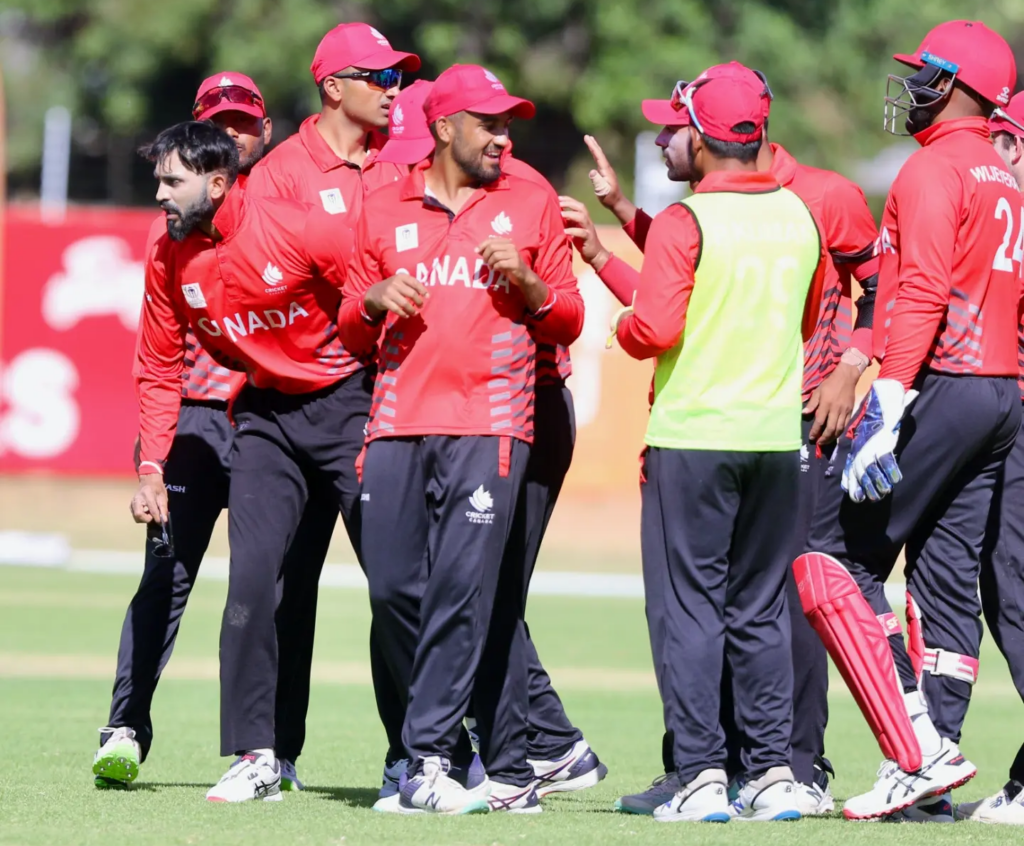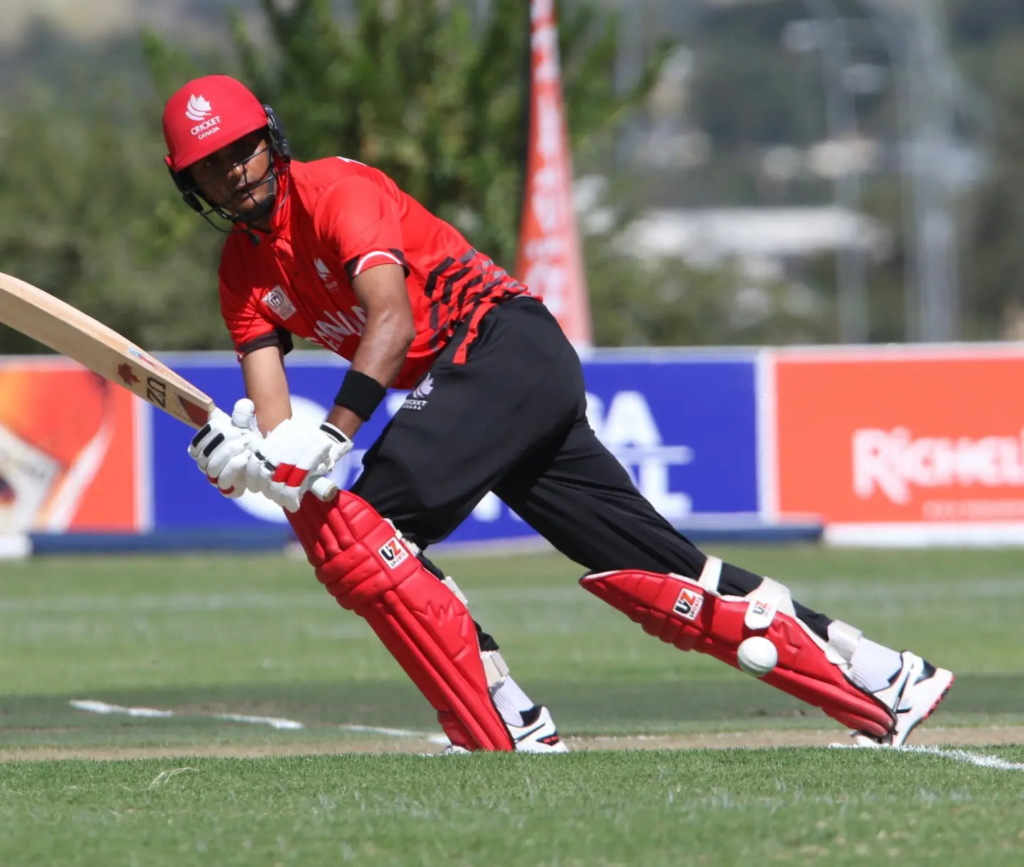A genius coach and ‘gamechanger’ that was ODI status: Rise of Canadian men’s cricket as T20 WC beckons
The build-up to the 2024 T20 World Cup is quickly catching pace and the mega event’s growing family tree is set to see the addition of the maple leaf. Canada breezed through the latter stages of the T20 World Cup Americas Qualifier in October 2023 to qualify for the men’s world cup, a first in their history.
The Sports Gazette caught up with Canadian national team all-rounder Harsh Thaker and head coach Pubudu Dassanayake, who shed light on the team’s rise, the most crucial contributor to the same, and the cricketing system in Canada.

Back in 2018, the International Cricket Council (ICC) granted T20I status to all member nations. This year’s T20 World Cup will be the biggest ever in terms of participation, with 20 teams set to play, and this is part of the ICC’s aim to grow the sport globally through the shortest format.
Getting to play in a World Cup, and that too within the home region, is a big deal. “The exposure that we will get in the World Cup is massive…It’s always special to play the top teams. We can’t wait,” 26-year-old Thaker expressed.
The 2024 T20 World Cup is set to be co-hosted by the USA and the West Indies. Cricket in the neighboring Canada will now attract more global attention, and that is only expected to increase as the World Cup gets closer. T20 World Cup qualification is thus a watershed moment for Canada’s men’s team. But is it the most important event in their recent history?
Importance of ODI status
Before the T20 World Cup qualifiers, Canada participated in the 2023 ODI World Cup Qualifier Playoffs. While they fell short of the eventual goal of progressing to the Qualifiers, a top-four finish guaranteed the retention of ODI status after almost a decade. “That is a gamechanger,” Thaker describes the achievement.
The debate regarding the long-term future of ODIs will understandably continue, but for now, the format is here to stay, with the 2027 World Cup set to have 14 teams instead of 10. For associate teams, the perks of ODI status, which T20I status does not include, hold more relevance for growth. ICC funding is the biggest among those.
In Canada’s case, players received central contracts as a result of that additional funding for the board, meaning players can rely on cricket as a profession and devote the time needed to excel at the highest level. Along with funding, support, and more attention, the team is also on a pathway that guarantees them a lot more international cricket in the ODI circle, with all roads leading to the 2027 World Cup qualifiers. Such benefits contribute to overall growth, beyond just the ODI circuit.
“What ODI status does is it gives us a plan for the next 3 years, the board gets a lot of funding because we are an ODI team now. T20 status doesn’t get you much,” Thaker expressed, on the importance of ODI status.
🚨BIG NEWS 🚨
We have now regained our ODI status after almost a decade and we are now confirmed to play ODI matches for next 4 year cycle!
Team Canada still disappointed that we can not qualify for the next round of @icc CWC qualifiers in Zimbabwe.#cricketcanada #odi pic.twitter.com/XcKj87od1e
— Cricket Canada (@canadiancricket) April 5, 2023
While there was some development over the past few years, Canada were without the benefits of ODI status for too long. Enter Pubudu Dassanayake, the man with a speciality.
A strong leader
“For Canada to hire me the main focus was to get ODI status back,” Dassanayake said on joining Canada in 2022 for a second stint. The Sri Lankan coach and former national player has an impressive track record with associate nations. Dassanayake guided Canada to the 2011 ODI World Cup, their last World Cup appearance, and was instrumental in them getting ODI status before that. He then also oversaw key phases of development for Nepal and the USA, helping both teams earn ODI status.
Thaker highlighted how immensely Dassanayake’s return to the squad last year has helped.
“Him coming into the Canadian system has completely changed how the board looks at cricket, how the players look at cricket. He brought a more professional look,” Thaker stressed. “Credit goes to captain (Saad Bin Zafar) and coach. They pushed a lot for these contracts. They pushed us a lot for ODI status.”
All the work put in so far has yielded key results. Cricket’s inclusion into the Olympic program for 2028 and beyond brings the sport more Sport Canada funding and government attention. But Dassanayake knows better than to take his eye off the ball. Building a strong grassroots system is the coach’s priority and he is positive that funding and the added attention that has recently come will assist with that goal.
“There is no difference between a full-member team and us when it comes to the U-19 level. From there, growth is the issue. We don’t have a first-class structure or good domestic structure to develop a player for the international level,” the coach expressed. “One of the highest priorities I have is to improve the system.”
At the same time, Dassanayake appealed to the West Indies for more assistance, as leaders of cricket within the Americas region.
“A full member in your region needs to lead. There are teams like the Netherlands, Scotland, Ireland, who are lucky to come under ECB’s umbrella. Whoever is touring the ECB is also giving games to these teams around England. Asia always has the Asia Cup and the Asian Cricket Council is making sure that upcoming teams play against decent teams. In our region, we need support from the West Indies.”
Global exposure
From a player’s perspective, Thaker pointed out the importance of exposure to global T20 leagues.
“Even some players in the national team going into the big leagues and getting picked, like Afghanistan’s players did, that would be massive…The experience they would bring back, and then everybody will feel like we can do this too,” Thaker said.

The T20 World Cup is a great opportunity to showcase their talents on the world stage. The biggest they have had so far! But going forward, “never losing” ODI status is among the highest of priorities for the coach and his team.